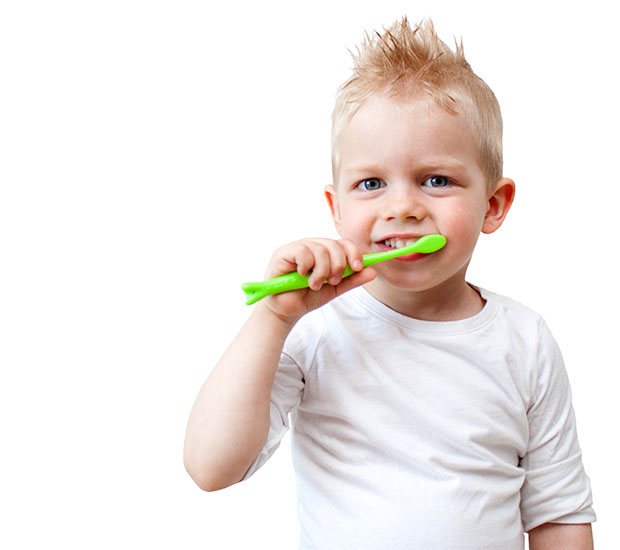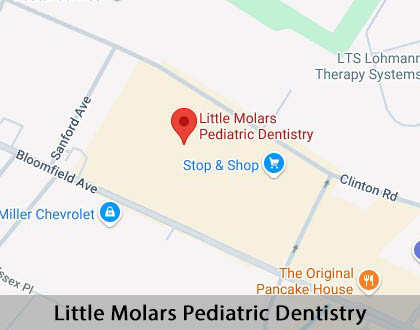How to Brush Your TeethWest Caldwell, NJ
Brushing is the foremost important aspect of attaining good oral health. Alongside flossing and visiting a dentist regularly, proper brushing can help children prevent many oral health conditions from arising. Brushing is as important in primary teeth as it is in permanent teeth. The primary, or baby, teeth pave the way for optimal development of our permanent teeth, but that also means they can cause many complications without proper care.
Proper brushing techniques and information are available at Little Molars Pediatric Dentistry in West Caldwell and the surrounding area. We can help your child achieve a healthy oral cavity by teaching them lifestyle habits, such as brushing correctly, to maintain good oral health. Call us at (862) 451-8222 to schedule an appointment to discuss the various treatment options.
The Importance of Brushing Your Teeth
Brushing helps prevent plaque, a clear film of bacteria that sticks to the teeth. Plaque consists of bacteria and feeds off of acids found in foods and beverages. Sugary foods and acidic beverages cause the most plaque buildup and are the greatest threat to the oral cavity. When plaque builds up, it breaks down our natural tooth enamel, the outermost layer that protects the teeth.
Plaque buildup eventually results in tartar, a hardened material of bacteria that can only be removed with professional dental tools. When plaque and tartar consistently remain on the teeth, enamel wears down, leading to tooth decay, cavities, and gum-related issues. Tartar is most common along the gum line, which causes the gums to swell and bleed. Eventually, the gums become weak and can easily develop gum disease. Proper brushing, flossing, and regular dental visits help prevent this occurrence and can keep the teeth, gums, and jaw healthy long-term.
“Brushing helps prevent plaque, a clear film of bacteria that sticks to the teeth.”
When to Brush Your Teeth
Dentists unanimously agree that brushing at least twice daily ensures healthy, clean teeth throughout the day. We recommend brushing once in the morning and once before bed for two minutes each time. Some people may brush after each meal to keep plaque at bay. However, it is important to avoid brushing for 15-30 minutes after eating or drinking as the acid can irritate the teeth and gums.
The American Dental Association (ADA) advises patients to use a soft-bristled toothbrush that fits inside their mouth. Children’s sizes go by age and are typically stated on the packaging. Make sure to change out the toothbrush every 3 to 4 months or as soon as the bristles become worn. Toothpaste should have a sufficient amount of fluoride, especially those that are ADA-approved.
“We recommend brushing once in the morning and once before bed for 2 minutes each time.”
Proper Tooth Brushing Technique
Proper brushing is just as important as frequency and length of time. Many people never learn the correct way to brush their teeth, and that number is even higher in children. We recommend all patients brush their teeth for at least 2 minutes. Young children (under 5) may need guidance on how to brush their teeth until they learn how to hold and brush on their own.
When brushing, the proper technique is 1.) hold the brush with an angle of about 45 degrees, center the brush between the teeth and gum line, and gently brush in a circular motion; 2.) ensure brushing the fronts, backs, and chewing surfaces of all teeth; 3.) finish off by brushing the tongue and roof of the mouth; 4.) rinse well and gargle.
Some patients sing a song in their head or put a timer on for two minutes until they are used to the length it takes. Each child is different, and some may take more time to grasp the technique in brushing each tooth properly. It is a good idea to monitor the child and check the angles as they brush until they can do it independently.
“Brush outside, inside, and chewing surfaces of the teeth, getting into the pits and crevices.”
Check out what others are saying about our dental services on Yelp: How to Brush Your Teeth in West Caldwell, NJ
Standard vs. Electric Toothbrushes
A standard toothbrush is manual (or handheld) and has a plastic or rubber handle and nylon bristles. They typically come in soft, medium, or hard bristles. There are a variety of new standard toothbrushes that use different bristles, such as bamboo, varying patterns, such as v-shape or wavy, and toothbrush heads, such as straight, contra-angle, non-slip grip, and flexible. There are vegan bristle brushes and special brushes for those with allergies.
Electric toothbrushes, or power brushes, are rechargeable and do most of the work. A 2019 study by the Oral Health Organization found that people who use an electric toothbrush have healthier gums, less tooth decay, and keep their teeth for longer, compared with those who use a manual toothbrush. Cochrane Oral Health Group found that there was an "11% reduction in plaque at one to three months of use, and a 21% reduction in plaque when assessed after three months of use.” Most electric toothbrushes provide more plaque removal, are gentler on the gums, contain a two-minute timer, clean tooth-by-tooth, and fulfill more strokes per minute (about 3,000 vs. 300 with manual).
“Most electric toothbrushes provide more plaque removal, are gentler on the gums, contain a 2-minute timer, clean tooth-by-tooth, and fulfill more strokes per minute…”
Questions Answered on This Page
Q. What is the importance of brushing your teeth?
Q. When should I brush my teeth?
Q. What is the proper brushing technique?
Q. What is the difference between standard and electric toothbrushes?
Q. What are other ways I can maintain good oral health?
People Also Ask
Q. What are some early warning signs of cavities?
Q. What are some signs and symptoms of childhood dental problems?
Other Ways to Maintain Oral Health
Aside from brushing, flossing is the single most important way to protect the teeth and gums and prevent oral health problems. Flossing removes plaque and excess food debris from between the teeth, a common breeding ground for bacteria. Many patients develop cavities in between the teeth, compromising not just one tooth but two. It is recommended to floss before brushing, in order to reduce overall plaque and increase fluoride concentration on and in between the teeth.
Another crucial aspect of maintaining good oral health is regular dental checkups and cleanings. The dentist conducts a physical examination, takes X-rays, and provides a professional tooth cleaning, during routine dental visits. Early on, this exam helps detect signs of decay or dental complications, such as crowding issues. Dentists can often diagnose problem areas early and provide preventative treatments to help avoid further complications from arising later on. Even those who have clean, healthy teeth need a professional cleaning once or twice a year to maintain oral health.
“Flossing removes plaque and excess food debris from in between the teeth, a common breeding ground for bacteria.”
Frequently Asked Questions
Q. What is the proper way to brush my child’s teeth?
A. Children will likely need guidance during their first few years until they learn the proper technique for brushing on their own. We recommend starting with the front teeth and showing them the technique in the mirror, then working to the backs and finally the tongue. Hold the brush at a 45-degree angle against the gumline. Gently brush in short (about one tooth-wide) strokes on each side of every tooth.
Q. When do young children need to begin brushing their teeth?
A. Children should begin brushing their teeth as soon as their first tooth comes out. That would mean you are mostly brushing along their gums. This helps keep their gum line clean and builds a strong base for the coming teeth. As their teeth develop and they have their full set, you should apply the proper brushing technique.
Q. When do children first begin visiting a pediatric dentist?
A. Children should visit a pediatric dentist as soon as the first tooth appears or before their first birthday — whichever comes first. We examine the development of their teeth, gums, and jaw. We can also give any necessary recommendations to parents depending on their child’s case and make predictions of any treatments they may need through the first few years. It also helps us build a strong relationship with them at an early age and usually helps them learn the importance of oral health.
Q. When should I stop helping my child brush their teeth?
A. This will differ from child to child. Parents who help their child from an early age can slowly ease off while still monitoring them until they fulfill the proper technique on their own. You can assess when you feel your child is ready or ask them if they can show you how they brush independently.
Q. Should I also floss for my child?
A. Most young children (under six) do not know how to floss properly. We recommend flossing for your child until they learn the proper technique and can do it on their own. Continue monitoring them as they floss and ensure there is no breakage or bleeding. After a while, you will know when they are ready to floss independently.
Quality Pediatric Dental Services Can Transform Smiles
By visiting us as soon as possible, our team can help get your child the professional treatment they need.
Definition of Pediatric Dental Terminology
Call Us Today
Do not wait to teach your child the importance of brushing and maintaining their oral health. Younger kids that develop healthy habits early often maintain good standing through their adult years and suffer fewer dental complications. Call us today at 862-451-8222 to schedule an appointment or learn more about our services.
If you live in the West Caldwell area, call 862-451-8222 for an appointment in our West Caldwell office.
Helpful Related Links
- American Dental Association (ADA). Glossary of Dental Terms. 2024
About our business, license, and website security
- Little Molars Pediatric Dentistry was established in 2023.
- We accept the following payment methods: Cash, Discover, MasterCard, and Visa
- We serve patients from the following counties: Essex County
- We serve patients from the following cities: West Caldwell, Caldwell, North Caldwell, Fairfield, East Hanover, Montville, Verona, and Montclaire
- Norton Safe Web. View Details
- Trend Micro Site Safety Center. View Details
Back to top of How to Brush Your Teeth







